Shannon Hogan
Author of
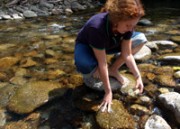
Access and download PowerPoint slides (in PDF) prepared by Jane Waterhouse, C2O Consulting, for presentation to government agencies involved in water quality management in the GBR.
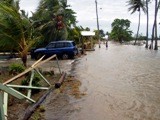
This report provides a synthesis of research on climate change and coastal science in the Torres Strait, and has been produced for the Australian Government’s Marine and Tropical Sciences Research Facility (MTSRF). It identifies and summarises work to date on reef evolution, hydrodynamics and sedimentary environments throughout the Torres Strait. It describes the island dynamics at Boigu, Saibai, Masig, Poruma, Warraber and Iama Islands. Numerous studies relating to climatic change are reviewed and the most relevant regional predictions for climate change in the Torres Strait are presented. The potential physical and ecological impacts of these changes in the Torres Strait are also identified. Adaptation and mitigation measures are suggested and their outcomes and consequences are evaluated. The key principles from sustainable land use plans on the islands are summarised and knowledge gaps in the fields of both coastal and climatic science are identified to guide future research.
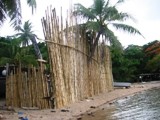
As part of its commitment under Theme 5 of the MTSRF, the Reef and Rainforest Research Centre publishes, or makes available, outputs (e.g. final technical or scientific reports, synthesis reports) from MTSRF-funded research projects nested within Research Themes 1-4.
Researchers funded through the Australian Government’s Marine and Tropical Sciences Research Facility (MTSRF) have worked closely with Torres Strait communities to improve our understanding of both the vulnerability of Torres Strait islands to climate change, and their adaptation capacity.
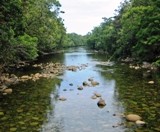
As part of its commitment under Theme 5 of the MTSRF, the Reef and Rainforest Research Centre publishes, or makes available, outputs (e.g. final technical or scientific reports, synthesis reports) from MTSRF-funded research projects nested within Research Themes 1-4.
In response to the needs of managers of the Great Barrier Reef, a key focus area of the Australian Government's Marine and Tropical Sciences Research Facility (MTSRF) has been the development of thresholds of pollutants of concern in freshwater, estuarine and marine ecosystems. The outcomes of this research are summarised in this report, starting with an overview of new knowledge of the impacts of degraded water quality, and outlining how this work has been translated into threshold values and, ultimately in some cases, management guidelines for the GBR.
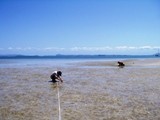
As part of its commitment under Theme 5 of the MTSRF, the Reef and Rainforest Research Centre publishes, or makes available, outputs (e.g. final technical or scientific reports, synthesis reports) from MTSRF-funded research projects nested within Research Themes 1-4.
The Great Barrier Reef (GBR) is a diverse ecosystem, which is bounded on its western side by a large number of large and small catchments. Protecting GBR ecosystems and the quality of the water they rely upon has become a major priority for resource managers and the community as a whole. Water quality and ecosystem health monitoring is needed to assess current status, identify existing and emerging problems, evaluate the consequences of various anthropogenic land and water use practices, devise improved practices and assess the effectiveness of management measures.




